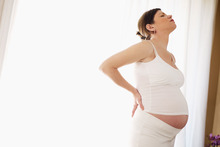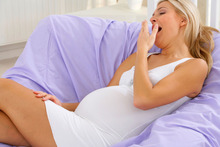Your
body has a great deal to do during pregnancy. Sometimes the changes
taking place will cause irritation or discomfort, and on occasions they
may seem quite alarming. There is rarely any need for alarm but you
should mention anything that is worrying you to your maternity team.
Below you will find some common discomforts that women can have at
various stages of their pregnancy including cramps, headaches, stretch
marks, swollen ankles and varicose veins. see them abeg

Morning sickness
Morning
sickness is a common symptom of early pregnancy that usually goes away
by the end of the first three months. Morning sickness or nausea (with
or without vomiting) can happen at any time of the day and is caused by
changes in hormones during pregnancy.

Backache in pregnancy
During
pregnancy, the ligaments in your body naturally become softer and
stretch to prepare you for labour. This can put a strain on the joints
of your lower back and pelvis, which can cause backache.There are
several things you can do to help prevent backache during your
pregnancy.

Bladder and bowel problems during pregnancy
During
pregnancy, many women experience some rather unpleasant conditions.
Maintaining a healthy diet and doing regular exercise can help make your
pregnancy a bit less uncomfortable.

Changes to your skin during pregnancy
As
your pregnancy develops, you may find that you experience changes to
your skin and hair. Some women can develop dark patches on their face
and hormonal changes can make your skin a little darker.

Dealing with cramps, swelling and varicose veins
Cramps,
swelling and varicose veins are some of the most well known issues
women experience during pregnancy. Maintaining a healthy lifestyle,
doing regular exercise and getting plenty of rest should help to
alleviate the symptoms.

Dealing with fatigue during your pregnancy
Feeling
tired and hotter than usual is quite common during pregnancy. Many
pregnant women also feel faint and this is due to hormonal changes.

Headaches and indigestion during pregnancy
Many
women find that they experience headaches and indigestion at various
stages of their pregnancy. Making changes to your lifestyle, like
getting plenty of rest and maintaining a healthy diet can help improve
some of the symptoms.

Vaginal discharge during pregnancy
During
pregnancy, almost all women have more vaginal discharge. This happens
because the cervix (neck of the womb) and vaginal walls get softer
during pregnancy and discharge increases to help prevent any infections
travelling up from the vagina to the womb.

Vaginal thrush during pregnancy
You
are more at risk of getting thrush while you’re pregnant. Changes in
the levels of female hormones, such as oestrogen, increase your chances
of developing thrush and make it more likely to keep coming back.
- Backache
- Bleeding
- Bleeding gums
- Constipation
- Cramp
- Deep vein thrombosis (DVT)
- Faintness
- Feeling hot
- Headaches
- High blood pressure and pre-eclampsia
- Incontinence
- Indigestion and heartburn
- Itching
- Leaking nipples
- Morning sickness and nausea
- Nosebleeds
- Urinating a lot
- Pelvic pain
- Piles (haemorrhoids)
- Skin and hair
- Sleeplessness
- Stretch marks
- Swollen ankles, feet, fingers
- Teeth and gums
- Tiredness
- Vaginal discharge
- Vaginal bleeding
- Varicose veins


No comments:
Post a Comment